Ever get the feeling you’re being spied on? Sometimes, it isn’t just paranoia. Your phone may be getting tracked, and people could be listening to your private conversations. Whether it’s a jealous spouse or the National Security Agency, there are ways to know if your phone has an unwanted outside listener.
How someone can track your phone
How does someone go about hacking your phone? While we don’t want to provide an in-depth tutorial to bad people, we will go over the usual methods in a generalized way.
Check your Mac for spyware
iPhone location tracking
The iPhone’s Find My feature is invaluable for locating a lost phone. It is also a lifesaver if you get lost and you need to share your current location with someone. The downside is that anyone with access to your iCloud account can watch your every move on Apple Maps.

On a related note, if you enable this feature, your iPhone logs all the places you frequent the most. These can be used to build a picture of where you are most likely to be going.
Phone and Wi-Fi signals
While you are out and about with your phone, it attempts to connect to local networks. When you pass a cell tower, the phone pings it, like it is saying hello. When it passes a Wi-Fi hotspot, the network will appear on your list of available networks with the option to connect.
These elements can be logged on your phone, and they are ways that someone with the right tools can use to see where you are going and where you have been.
The phone’s SIM card
When you switch your phone on, it will immediately ping the nearest cell tower. That cell tower will then ping other cell towers with your phone’s SIM information.
Each tower will emit a different signal strength, depending on where you are. The closer you are to one tower, the stronger the signal. The further away you are, the weaker the signal.
Using these signal strengths, someone tracking you can determine the area you are in, which can be narrowed down to a surprisingly small area in a process called triangulation.
Someone pretending to be law enforcement
If someone calls you and says they are a police officer, what are the chances you are going to question it? It is human nature to respond to and obey people in authority.
So, if they say they’re a cop and ask for your International Mobile Equipment Identity number (IMEI), your current location, and other personal information to assist in an important investigation, you might cooperate.
Directly installing malware on the phone
If you leave your phone lying around, any bad actor can grab it and directly install spyware on the device. You would be none the wiser when you went back to get it again.
Who might be monitoring your phone, and why?
If you are the target of a government agency, then you have bigger problems than your phone being tapped. And while the chance of an ordinary individual being the target of an intelligence agency is realistically very low (unless you’re a terrorist or a political dissident), that doesn’t mean you can breathe easily. There are other people who may want to keep tabs on you.
Who might be tracking you?
Here’s a quick list of possible individuals who might be tracking you:
- A jealous partner or a jilted lover
- A suspicious business partner — or a simply dishonest one
- A private investigator hired by someone to monitor you
- A dishonest lawyer looking for incriminating evidence on behalf of their client
- A stalker or mentally disturbed individual
- A criminal intent on abducting you and/or harming you
Why someone might be tapping your phone
What motive could someone have for tracking your phone? Here are a few possibilities:
- A jealous partner may think you’re having an affair. A jilted lover may want to know who you’re seeing now.
- A business partner may suspect you of malpractice. Or they may be plotting to oust you from the company and are looking for something incriminating. They may hire a private investigator who will likely have contacts in phone companies, as well as possess the tools to track you efficiently.
- If you are the subject of a lawsuit, in the middle of a messy divorce, or suspected of a crime, a lawyer may decide to track your movements to gather evidence.
- While you might find it unlikely that you would be the unfortunate focus of a stalker or another mentally disturbed person, the risk goes up if you are a public figure or celebrity.
- A criminal may be planning to abduct you or harm you. The reasons for this are endless.
Is your phone being tracked, and how can you find out?
So, how do you find out if your phone is being tracked? How do you go from a paranoid suspicion to a confirmation?
There are various telltale signs to look out for. If it is the government, you will most likely never know until they are knocking on your door. But others will not be so subtle because they simply lack the tools to be more stealthy.

Signs that your phone is being monitored
The following are not guaranteed signs of your phone being tapped. There could be other innocent explanations. However, these signs should not be ignored.
The phone’s battery is draining or overheating
This could merely be the sign of a malfunctioning battery. But it could also be unwanted background processes, such as a malware-infected app.
Malicious apps
If you were tricked into installing a malicious app or someone directly installed one on your device, they may have spyware installed. As a result, they will pass your data to an online third-party server. It could also be the reason for all the other problems you’re having, such as the battery draining.
Your phone is continually crashing
If your phone crashes all the time, this could be due to malicious apps or spyware overloading the phone’s capabilities.
Faster data usage
If spyware is constantly sending your data to an external server, it will likely consume a large amount of your data plan by doing so.
Your Wi-Fi is slow and/or unstable
Are you noticing that your Wi-Fi has suddenly become slower and more unstable? This can be due to interference from an app that’s tracking you.
Frequent suspicious calls and SMS messages
If you receive frequent suspicious calls and SMS messages, this could be a sign that someone is trying to track your activity. Keep a close eye on SMS messages that have links you are being coerced into clicking.
Unusual sounds on the phone line
This may sound a bit like a Hollywood thriller, but hearing clicking and buzzing sounds while you’re talking to someone could indicate that someone is interfering with the line. However, it could also simply be a bad connection.
Questions and answers about tracking and tapping phones
You may have a quick, specific question about phone tracking that hasn’t already been covered. Read on to see if your question is answered here.
Yes, it is possible to track a phone without a SIM card. A phone can be tracked via Wi-Fi hotspots, cell towers, Bluetooth, an IMEI number, or malware on the device.
A phone cannot be tracked while in airplane mode, as the setting disables cell signals, Wi-Fi, and Bluetooth. However, tracking methods are evolving all the time, so airplane mode may not be an absolute guarantee against tracking.
Turning off a phone makes it extremely difficult to track but not impossible. For example, an iPhone’s Find My feature notes the phone’s last known location before the device was switched off. If you are still near that location, you can still be found.
Yes, a phone can be monitored using its IMEI number (a unique device identification code). The device can be enabled or disabled remotely, and a tracking tool can locate the phone based simply on the IMEI number.
Someone can trace your phone when you pick up a call. Your phone will ping a cell tower, which will then give the general location where you are. They need to keep you on the phone to triangulate your location more precisely.
No, it is not legal to tap someone’s iPhone unless you are law enforcement with a legally issued court warrant.
How to stop your iPhone from being tracked
If you think your iPhone has already been compromised, how do you cut the connection and shake off your pursuers? If it’s the government, the best course of action may be to dump your phone and run.
As long as you aren’t doing something that threatens national security, the following 3 tips can have an immediate impact on stopping covert surveillance in its tracks.
Change your iCloud password

If someone has managed to access your iCloud account, they can track you using the Find My feature. Fortunately, you can stop this immediately by changing the iCloud password and logging out of all other sessions to kick the intruder out. Adding 2-step authentication will also lock down your account.
While you’re at it, ask yourself if you really need Find My enabled in the first place. If not, disable it.
Remove all unrecognized apps
Go through all the installed apps and delete any that you don’t recognize. Sometimes, malicious apps are made to look like legitimate trusted apps. If, therefore, you know for sure that you didn’t install Snapchat, delete it.
Factory-reset the phone
The fastest way to get rid of any tracking is to reset the phone to its factory settings.
Do not reinstall from an iCloud backup because that backup could most likely have the malware included. Reset it as a brand new phone and delete the backups from iCloud.
What are the best ways to protect your phone from being tapped?
If you have been the victim of a phone tap or want to avoid becoming a victim, the following proactive measures will help keep you safe.
Never install apps outside of the iOS App Store
Apple has strict security protocols in place for an app to be listed in the App Store. That means you can trust whatever is there because it has been vetted first. If someone wants you to jailbreak your phone and side-load an app, don’t do it.
Have strong passwords and 2FA enabled
Always have strong passwords on all of your online accounts, especially iCloud. Also, enable 2-factor authentication to give yourself a second layer of protection.
A strong password is not “opensesame123.” It is more like “w96XNBJs@QJrZz4cE7EFA#.” Use an encrypted password manager to store your password, and change the passwords once a month, not once a year.
Don’t click links in emails and SMS messages
One of the most effective ways that hackers get spyware onto phones is through social engineering. The goal is to trick you into clicking a malware-infected link in an email or SMS.
In general, don’t click on links in email or SMS messages, period.
Put your phone in Airplane Mode when you’re not using it
As we explained above, putting your phone in Airplane Mode shuts down 3 of the phone’s most important functions: cellular signal, Wi-Fi, and Bluetooth. This makes tracking you much more difficult, unless the tracker has more advanced tools at their disposal.
Use a VPN

It becomes much harder to track your online activity if everything is being diverted through an encrypted VPN tunnel to another country’s servers.
The best VPN to use is ClearVPN. For the price of a cup of coffee, you can lock down your online data activity and divert it hundreds or thousands of miles away from your actual location.
Don’t give carte-blanche app permissions
When you install an app on your phone, it usually asks for lots of permissions to access your phone’s features. But before you accept everything it asks for, stop for a minute.
Does that cool racing game really need access to your camera and microphone? Does your crypto wallet really need access to your Wi-Fi network?
Install all iOS updates
Apple regularly issues security updates, and for good reason. These updates seal security vulnerabilities that hackers or trackers can potentially take advantage of. If you fail to install the updates, you’re leaving the front door wide open for someone to walk right through.
Don’t let your phone out of your sight
Someone seeking to track you may simply try to access your phone directly. Leaving your phone unattended for even a moment could be all the person needs to install spyware.
Always keep your phone in your pocket. Never loan it to anyone. And always protect your phone with a PIN. At the very least, enable Face ID.
You may be under the impression that unless you are the subject of a criminal investigation or being pursued by the CIA, you will never be a victim of your phone being tracked. However, as we have demonstrated, your phone could be tapped by anyone, from a jealous spouse to a suspicious business partner or a criminal. It pays to be vigilant.
This is an independent publication, and it has not been authorized, sponsored, or otherwise approved by Apple Inc. iPhone, iOS, and Find My are trademarks of Apple Inc.







